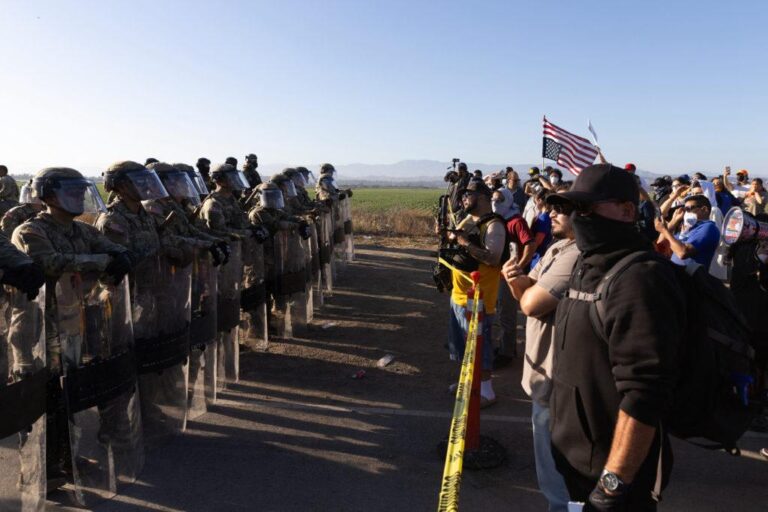A recent poll highlights a significant shift in American public opinion on immigration since Donald Trump assumed the presidency in 2017. Conducted by PBS, the survey reveals evolving attitudes that reflect broader political and social changes over the past several years. This analysis explores how views on immigration policy, border security, and immigrant communities have transformed, providing insight into the complex landscape of U.S. immigration debates in the post-Trump era.
Changing Public Perceptions of Immigration Since the Trump Administration
Public opinion on immigration in the United States has experienced noticeable shifts since the Trump administration’s tenure began in 2017. According to recent polling data, the national conversation, once largely dominated by heated rhetoric and stringent policy measures, has gradually softened in tone, reflecting a more nuanced understanding among the American populace. While immigration remains a politically charged topic, increased awareness of immigrants’ contributions and the complexity of migration factors have influenced a subtle but meaningful change in public attitudes.
Key trends highlighted by the poll reveal several evolving perceptions:
- Growing empathy: More Americans now recognize the humanitarian aspects of immigration, supporting policies that provide pathways to citizenship.
- Economic impact awareness: There is greater acknowledgment of immigrants’ role in the workforce and local economies, challenging earlier, more negative stereotypes.
- Security concerns balanced: While border security remains a concern, fewer respondents prioritize it over comprehensive immigration reform.
| Year | Support for Path to Citizenship (%) | Concern About Illegal Immigration (%) |
|---|---|---|
| 2017 | 45 | 68 |
| 2020 | 56 | 59 |
| 2024 | 62 | 52 |
Key Factors Influencing Shifts in Attitudes Toward Immigration Policy
Several critical elements have played a role in evolving American public opinion on immigration since 2017. Notably, economic fluctuations have often swayed perceptions, with economic downturns tending to increase skepticism about immigration‚Äôs impact on local employment. Additionally, the media‚Äôs tone‚ÄĒranging from emphasizing humanitarian concerns to focusing on security risks‚ÄĒhas been pivotal in shaping how Americans view immigration policy. The intersection of political leadership signals and high-profile immigration events, such as family separations at the border, also triggered noticeable shifts in public attitudes.
Key contributors influencing these shifts include:
- Economic conditions: Job market health and wage trends
- Presidential rhetoric: Policy statements and campaign discourse
- Media framing: Coverage angle on immigration stories
- National security concerns: Terrorism and crime-related narratives
- Demographic changes: Shifts in population diversity
| Factor | Impact on Attitude |
|---|---|
| Economic Uncertainty | Strengthened demand for tighter controls |
| Political Messaging | Polarized public opinion |
| Media Coverage | Raised awareness and empathy in some demographics |
Implications for Future U.S. Immigration Legislation and Enforcement
As public opinion on immigration continues to evolve, lawmakers face increasing pressure to rethink policies that have long shaped the U.S. immigration system. The poll reveals a growing acceptance of diverse immigrant populations and a nuanced approach to enforcement, signaling a potential shift towards more humanitarian and reformative legislation. Key areas likely to see change include:
- Expansion of pathways to citizenship for undocumented immigrants
- Enhanced protections for immigrant workers and their families
- Targeted enforcement focusing on serious criminal activities rather than broad deportations
- Investment in technology and resources to improve border security without compromising civil liberties
Policy makers and enforcement agencies are expected to balance security concerns with growing public support for immigrant integration. The poll data suggests that bipartisan initiatives could gain traction, especially those promoting economic contributions and community safety. Below is a simplified projection of legislative priorities informed by current public sentiment:
| Legislative Priority | Expected Public Support | Enforcement Focus |
|---|---|---|
| Pathways to Legal Status | High (65%) | Selective, case-by-case review |
| Border Security Enhancements | Moderate (50%) | Technology-based, non-intrusive |
| Workplace Protection Laws | High (70%) | Focus on labor violations, not immigration status |
Recommendations for Policymakers to Address Evolving Public Concerns
Policymakers should prioritize transparent and fact-based communication to rebuild public trust surrounding immigration issues. This involves not only addressing misinformation but also clearly articulating the economic and social benefits of immigration. Engaging directly with communities impacted by immigration policy will foster a more nuanced understanding of concerns on all sides. Additionally, integrating regular public feedback mechanisms can help adjust strategies in real time, ensuring policies resonate with evolving public sentiments.
In practical terms, a balanced approach that includes both border security enhancements and comprehensive reform stands as a cornerstone for progress. Supporting immigrant integration through education and workforce programs can alleviate anxieties tied to economic competition and cultural change. Below is a concise framework for action, outlining key focus areas:
| Focus Area | Policy Recommendation | Expected Outcome |
|---|---|---|
| Communication | Launch fact-based public awareness campaigns | Increased trust and reduced misinformation |
| Community Engagement | Host town halls and listening sessions | Better policy responsiveness |
| Border Security | Enhance technology without harsh enforcement | Safe and humane border management |
| Integration Programs | Expand language and job training | Stronger immigrant contribution to economy |
Final Thoughts
As the nation continues to grapple with immigration policy, the PBS poll underscores a significant shift in public opinion since the Trump administration took office. These changing attitudes reflect broader debates about the future direction of U.S. immigration policy and its impact on society. Moving forward, policymakers will need to consider these evolving viewpoints as they navigate one of the country’s most complex and contentious issues.




